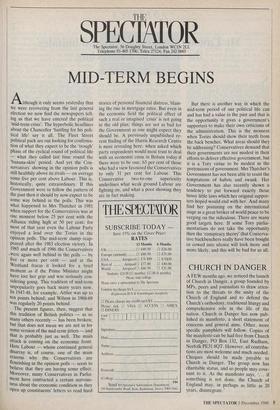THE
The Spectator, 56 Doughty Street, London WC1N 2LL Telephone 01-405 1706; Telex 27124; Fax 242 0603
MID—TERM BEGINS
Although it only seems yesterday that we were recovering from the last general election we now find the newspapers tell- ing us that we have entered the political 'mid-term crisis'. The hyperbolic headlines about the Chancellor 'battling for his poli- tical life' say it all. The Fleet Street political pack are out looking for confirma- tion of what they expect to be the 'trough' phase of the cyclical round of political life — what they called last time round the 'banana-skin' period. And yet the Con- servatives' showing in the opinion polls is still healthily above its rivals — on average some five per cent above Labour. This is, historically, quite extraordinary. If this Government were to follow the pattern of the past then it should by now expect to be some way behind in the polls. This was what happened to Mrs Thatcher in 1981 when support for the Conservatives was at one moment below 25 per cent with the Alliance riding high at 50 per cent; for most of that year even the Labour Party enjoyed a lead over the Tories in the Opinion polls. The mid-term slump reap- peared after the 1983 election victory. In 1985 and much of 1986 the Conservatives ,were again well behind in the polls — by five or more per cent — and at the Westland fracas it looked for a brief motherit , as if the Prime Minister might have lost her grip and was seriously con- sidering going. This tradition of mid-term unpopularity goes back many years now. In 1947-48, for example, Attlee was up to ten points behind; and Wilson in 1968-69 was regularly 20 points behind.
The present figures, then, suggest that this tradition of British politics — as so many others recently — has been broken; but that does not mean we are not in for some version of the mid-term jitters — and that is probably just as well. The main attack is coming on the economic front. Here Labour — whose continued general disarray is, of course, one of the main reasons why the Conservatives are flourishing in the opinion polls — seem to believe that they are having some effect. Moreover, many Conservatives in Parlia- ment have contracted a certain nervous- ness about the economic condition as they Open up constituents' letters to read hard
stories of personal financial distress, blam- ing the rise in mortgage rates. But even in the economic field the political effect of such a real or imagined 'crisis' is not going to the old plan; things are not as bad for the Government as one might expect they should be. A previously unpublished re- cent finding of the Harris Research Centre is most revealing here: when asked which party respondents would most trust to deal with an economic crisis in Britain today if there were to be one, 63 per cent of those who had a view favoured the Conservatives to only 31 per cent for Labour. This Conservative two-to-one superiority underlines what weak ground Labour are fighting on, and what a poor showing they are in fact making. But there is another way in which the mid-term period of our political life can and has had a value in the past and that is the opportunity it gives a government's supporters to make their own criticisms of the administration. This is the moment when Tories should show their teeth from the back benches. What areas should they be addressing? Conservatives demand that their governments are not modest in their efforts to deliver effective government, but it is a Tory virtue to be modest in the pretensions of government. Mrs Thatcher's Government has not been able to resist the temptations of hubris and swank. Her Government has also recently shown a tendency to Put forward exactly those bossy little laws which her original suppor- ters hoped would end with her. And many find her posturing on the international stage as a great broker of world peace to be verging on the ridiculous. There are many good targets here. If some Tory parlia- mentarians do not take the opportunity then the 'conspiracy theory' that Conserva- tive backbenchers really have been bought or cowed into silence will look More and more likely, and this will be bad for us all.


































































 Previous page
Previous page